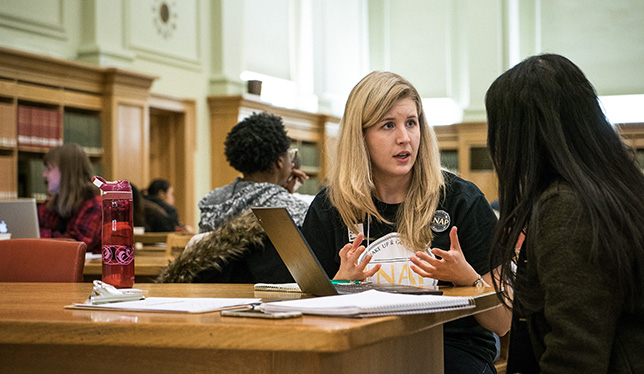
When Lucie Moussu, director of the University of Alberta’s Centre for Writers, hosted her school’s first Long Night Against Procrastination in 2014, she was blown away by the response. The all-night writing and studying event, held in the library, was designed to help students confront daunting deadlines with the support of one-on-one tutors, creative writing coaches and learning strategists. “I was stunned by the atmosphere,” says Dr. Moussu, who is also an associate professor in writing studies at the university. “You could feel the excitement – the tutors were busy all night.”
The writing centre initiative, borrowed from Germany where it originated in 2010, is catching on in North America. At least 16 universities across Canada coordinated the timing of the inaugural LNAP events in 2014. Since then, organizers at each university have taken a more customized approach, adjusting the dates and scope as required: OCAD University and Brandon University, for example, have chosen to run the LNAP once per semester from dusk to sunrise; the annual Trent University and Wilfrid Laurier University events wrap up at midnight. Western University put on a pizza party while U of A opted to organize a midnight buffet.
The second annual event at U of A, which started on Nov. 6, attracted more than 500 participants. Dr. Moussu scheduled non-stop stress-busting activities (pet therapy sessions, tango lessons, yoga) and productivity-inspiring workshops (library tips, time-management strategies, the art of editing) along with peer and professional support services starting at 8 p.m. and continuing straight through until the catered “Survivor’s Breakfast” at 7 a.m. It was the culmination of eight months of planning, $15,000 in fundraising and the recruitment of 135 volunteers.
However, despite it being one of the proudest moments of her life, says Dr. Moussu, she’s unlikely to do it again. She recently discovered that several key administrators made the decision to no longer support the event. One associate dean criticized LNAP in an open letter for “teaching bad habits” and “encouraging students to binge-write.” She insists the opposite is true. “Writing is too often associated with lonely suffering,” wrote Dr. Moussu in her final report on the inaugural LNAP in 2014. “We want to teach and promote healthy habits. We want to provide a supportive, creative, innovative and relaxed environment for teaching and learning.”
Dr. Moussu says the communal twist on the traditional “all-nighter” was designed to showcase the work of writing centres, but also to cater to students whose personal schedules might not allow them to benefit from the centre’s support during the daytime. “It’s such a community-building event,” she says. “That should be really strongly encouraged.”